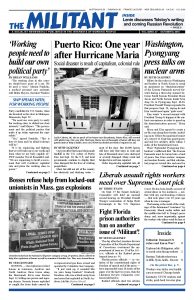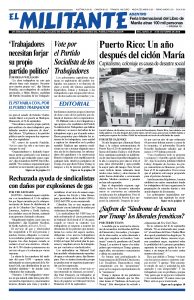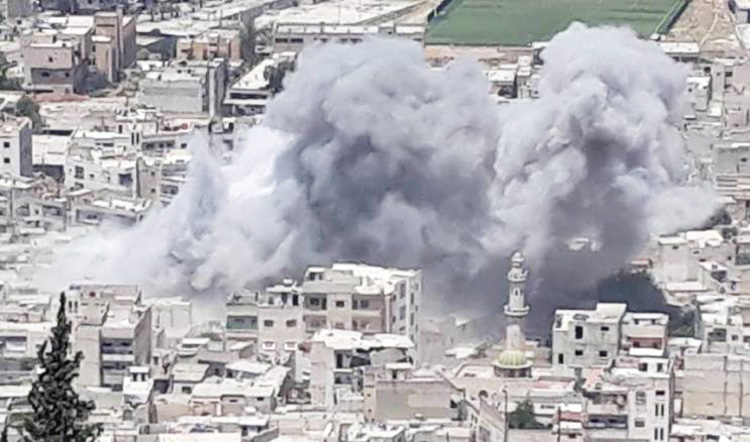 The capitalist rulers in Russia and Turkey signed a new “demilitarized zone” agreement Sept. 17, halting, for now, the bombardment against rebel forces and civilians in Idlib province in Syria. Government troops and Tehran-backed militia had been poised for a ground assault.
The capitalist rulers in Russia and Turkey signed a new “demilitarized zone” agreement Sept. 17, halting, for now, the bombardment against rebel forces and civilians in Idlib province in Syria. Government troops and Tehran-backed militia had been poised for a ground assault.
Idlib, home to some 3 million people had been pounded since Sept. 8, forcing thousands to flee to the north. It is the last remaining area held by anti-Assad opposition groups, which includes pro-Turkish government forces and some former al-Qaeda forces.
In 2011 working people across Syria rose up in a wave of powerful street protests against the brutal dictatorship of Bashar al-Assad. Their uprising was crushed in blood, with thousands arrested, tortured and disappeared. Foes of the regime organized a variety of rebel units that pushed Assad’s forces out of larger and larger parts of the country, including most major cities. This was done without any significant aid from Washington or capitalist rulers in the region who professed to support the opposition forces.
Assad’s Arab Baath Socialist Party had postured for decades as a defender of the Arab peoples across the region against Washington and other imperialist powers. In fact it was always a tyrannical regime dominated by a layer of capitalist families, largely from Syria’s Alawite minority, who defended their class interests against the largely Sunni working people and the oppressed Kurdish nationality.
The reactionary Islamic State took advantage of the situation to seize and oppress parts of the country. While U.S. air power in alliance with Kurdish-led Syrian Democratic Forces on the ground pushed back IS, Assad was only able to retake territory from the rebels when Moscow intervened with its bombers. Tehran-backed forces, like the Lebanese Hezbollah, also took a decisive part in the fighting.
The rebel forces, which got little help or arms from Saudi, Turkish and U.S. rulers, were outgunned and gave way. Many were convinced to sign “de-escalation” agreements and were permitted to travel to Idlib, where they find themselves entrapped today.
The Assad regime still remains locked out of 25 percent of Syria east of the Euphrates River, held by the Syrian Democratic Forces. This is the one question that united Assad and the rulers in Moscow and Ankara — a desire to beat back the Kurds. Russian Foreign Minister Sergei Lavrov said Sept. 21 that the U.S.-backed forces’ control over the eastern bank of the Euphrates is the main threat to Assad’s total control over Syria.
Turkish President Recep Tayyip Erdogan said Sept. 23 that the biggest threat to Syria’s future is what he called the “terror swamp” of Kurdish control there.
Ankara fears the gains made by Kurds in Syria will embolden Turkey’s own Kurdish population. The over 30 million Kurds across Iraq, Iran, Syria and Turkey are denied a homeland by the rulers there and have fought against the suppression of their national rights for decades.
Washington says its troop deployment alongside the Kurds is for mop-up operations against Islamic State, and to defend its Kurdish-led allies. But the U.S. rulers’ real concern is to step up efforts to push back Tehran, which has deployed its armed forces around Syria to increase its political influence, economic exploitation and threats to capitalist rivals across the Mideast.
Deal in question
While leaders of pro-Turkish groups hailed the Idlib deal, and working people there said they were glad for the respite from the barrel bombs of the regime and Moscow’s airstrikes, the agreement between Moscow and Ankara seems virtually impossible to realize. All Islamist groups there would have to relinquish their heavy weaponry by mid-October and leave Idlib — with nowhere else to go. Other fighters would also have to give up their larger arms and foreswear further attacks on Assad’s rule. Then the Russian and Turkish governments would deploy troops to a roughly 10-mile-wide demilitarized zone between Idlib and the troops of the Assad regime and its allies.
“Together with Russia we will put our efforts into clearing those territories of radical elements,” Erdogan said.
Residents of Idlib interviewed by Al Jazeera expressed relief that for now the deadly air assaults are paused. Many took to the streets Sept. 21, demanding Assad’s removal from power. Thousands who fled the province earlier in the month have begun to return to their homes.
At the same time, the Turkish-backed National Liberation Front groups in Syria issued a statement Sept. 23 expressing “mistrust of the Russian enemy” for breaking past “de-escalation” deals and for “carrying out massacres, war crimes, and forcible displacement against our civilian people.”
The reactionary Islamist groups Hurras al-Din denounced the deal as “a conspiracy by the forces of international evil and infidelity against the jihadist project.”
As it bolsters Assad, Moscow seeks to consolidate its hold on the Russian naval base at Tartus on Syria’s Mediterranean coast and expand its political and economic interests.
The turning point in the Syrian war has led all the rival capitalist powers — the U.S. imperialist rulers and the capitalist governments in Moscow, Tehran, Ankara and Saudi Arabia — to look for how they will advance their national interests.
The Israeli rulers — like Washington — are especially concerned about the advance of Tehran’s military and political reach. Tel Aviv admits it has carried out over 200 military strikes against Iranian weapons convoys and other targets in Syria over the last year and a half.
The most recent action was when Israeli F-16 jets attacked a weapons transfer to Hezbollah forces at a Syrian military base in Latakia Sept. 18. The Assad regime responded with anti-aircraft fire and hit a Russian intelligence aircraft in the area, killing 15 Russian soldiers.
Russian President Vladimir Putin tried to downplay Tel Aviv’s responsibility after the Russian Defense Ministry attempted to blame the Israeli government for the downing of the plane. He described the deaths as “tragic chance events.”
The dispute is still simmering. Russian Defense Ministry spokesman Gen. Igor Konashenkov said Sept. 23 that the Israeli pilots were guilty of “a minimum criminal negligence.”



